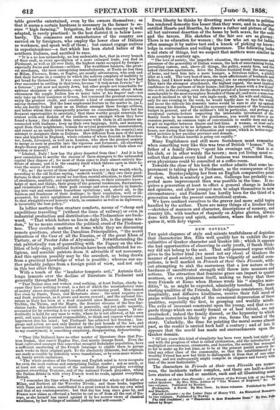NEW NOVELS. * THE quiet elegance of style and minute truthfulness
of depiction that characterize Mrs. Ellis well qualify her to exhibit the pe- culiarities of Quaker character and Quaker life ; which it appears she had opportunities of observing in early youth, if Sarah Stick- ney did not belong to the sect. That self-possessed repose which gives to the better kind (we must not say class) of Quakers the manner of good society, and lessens the vulgarity of sordid occu- pations, is well marked in Friends at their Own Fireside, with- out attempting to sink the coarseness that a low nature or the hardness of uncultivated strength will throw into manners and actions. The attraction that feminine grace can impart to quaint neatness, or even plainness itself, making us fancy that there were Friends at Rome when Horace wrote his " simplex man- ditiis " is, as might be expected, admirably touched. The more sterling qualities of the Friends, their religious consistency, frank hospitality, and diffusive kindliness, receive their full rased of praise without losing sight of the occasional depravation of these qualities, especially the first, in grasping and worldly minds. The evils of incessant constraint upon the young, and that as re- gards things which are mostly formal or at best trivial, are not overlooked ; indeed the family discord, or the hypocrisy needless restraint is likely to give rise, forms the moraloralth ostory. Unluckily, the time for pointing the moral seems almost past, as the reader is carried back half a century; and of late it
which
needless appears that the world has made sad encroachments upon the Quaker domain.
" Of late years this kind of simplicity has been very much lost sight of; and with the progress of what is called civilization, and the introduction of multiplied conveniences, ornaments, and luxuries, society has managed so far to make up for lost time, as to be at the present period scarcely be- hind any other class of the community, so that the establishment of a wealthy Friend has now but little to distinguish it from that of any other person, and not unfrequently might compete in elegance and luxury with that of the most fashionable."
The characters in Friends at their own Fireside are nume- rous, the incidents rather complex, and there are half-a-dozen love stories of one kind or another, Loh and all illustrating some • Friends at their Own Fireside ; or Pictures of the Private Life of the People called Quakers. By Mrs. Ellis, Author of "The Women of England," fe.c. Ia two volumes. Published by Beutley. Heekington. A Novel. By Mrs. Gore. In three volumes. Published by Hurst
and Blackett.
Harold Leicester : or the Latter Days of Henry vu. An filstorical 1141"**** In two volumes. Published by Newby. The by Hope. rst; or " Handsome is that nsaasome Dow." By D°t• r116- lighed 'ty of the Friends. The centre of all, however, is the v of Jacob Law, a Quaker whose genial nature and sound 1 good sense, expanded by much contact with the world, would perhaps have been less strict in the formal parts of his persuasion, tad not his wife been a minister or preacher, and consequently held to be under inspiration. In a certain sense Jacobs con- sismney is the cause of the principal action and the deeper inte- rest ; for in order to preserve his son Reuben from the tempta-
tions of "
g out," he places him in the business-house of a very starched itlind hard Friend. The rigid George Rutherford and his more rigid-looking wife Johannah, do little good to any of the young people who are placed under their control as if at a religious academy. The best it would seem indulge in worldly amusements upon the sly ; Reuben becomes a wet Quaker without metaphor ; and Paul Rutherford, the son of the saint, is a start- ling sinner,—roué, hypocrite, and appropriator, to a large extent, chiefly "cheating his own father." It is from these two persons of the drama that the greater interests of the novel spring, though many lesser fortunes are connected with them.
We continually hear of " what mighty contests rise from trivial things": but is it ever really so ? The things may seem trivial—a party colour or a party cry, a cant term, or some worth- less leader—about whom no sane man would trouble his head ; but are all these not signs of things signified ? To abstract reason "the colours " are only a bit of bunting ; but they "con- tain the honour of the band, and the brave throng around their bearer," when the formation is broken, and the soldier's eye seeks a rallying-point. A turned-back instead of a stand-up collar seems a miall matter for an incident which is to originate a series of actions ; but it is one of the weapons with which, under the standard of the broad brim, the Friend encounters the " world." In putting off his single-collared coat the Quaker acts like a soldier who should throw away his arms. Hence Reuben Law causes a great sensation when he declares he will no longer wear the Quaker garb, moved less by a reasoned principle than by a dislike of trickery; for others in George Rutherford's establishment had dress-coats kept in secret, and put on secretly when they went" to evening-parties.
" Reuben startled his companions one day by declaring his determination to begin to wear, on all occasions, coats with turned-down collars, and no other. Some who heard this declaration laughed, for they did not believe he had the moral courage to carry out his resolution. They knew, what it is impossible for members of other societies to conceive, how much real daring this purpose would require ; and they doubted not but Reuben's firmness would fail before the hour of trial should come. Others endea- voured gravely to persuade him to give the project up. But this advice only made him more daring, and defiant. Others encouraged him, for they thought if once the ice was broken for them, they might also plunge in. " To show that he was really in earnest, Reuben exhibited before his friends, in visible departure from the old established rule, a number of garments, some new, and others altered, but all constructed after the forms and customs of the world, and consequently all requiring a vast amount of moral courage to put on and wear. Great excitement very na- turally pervaded the company of young men, who, looking and handling, and examining for themselves, were compelled to believe that Reuben was really in earnest. "Had intelligence been about to be communicated that day at dinner that Reuben had enlisted for a soldier, the apprehensions of each and all could scarcely have been worked up to a higher pitch. As time wore on many and varied were the calculations as to how the thing would be taken. All knew exactly how Johannah Rutherford would look, but in what style the lion would comport himself was beyond the power of any one to surmise. " When the dinner-hour arrived, Reuben, according to the custom of the family, walked in with the first set, for there was always a first and second party at that table. For some time no notice was taken, the master being too much occupied with what was immediately before him. At length,
however, his appetite being somewhat appeased, his eye found time to wander to the offending collar. But how could he believe even the testi- mony of his senses ? The fact was to him manifestly impossible. He looked again—long and earnestly. The young men held down their heads and some found it difficult to suppress their laughter, especially those who had caught a glimpse of Reuben's face, which wore evidently the expression of one who endeavours to look brave, whatever he may feel.
" Johannah Rutherford stared wildly, but spoke not. Her face seemed to come out farther than usual from the little background of cap behind. No sound was uttered, except that something like a suppressed roar might be detected occasionally, as George Rutherford conveyed large portions of meat into his mouth. Thus his meal was hastily despatched, when rising from his seat before the others, he walked with large heavy strides towards the door. Here, standing still for a moment, and half looking round, he said Reuben Law, thou wilt please not to come to my table again in that coat.'
" Oh, very well,' said Reuben as he rose, then I must go home, for I have no other.'
" This was all that passed at the time, but in the evening when the young men were retiring, Reuben was requested to remain, and a long oppor- tunity' took place between him and the master of the house, which Reuben was not fond of describing to any one, so much did it rouse his anger and disgust, even to think of it."
As the exhibition of a peculiar social state, such as it existed in Sarah Stickney's youth, is a main object of Mrs. Ellis's tale, there are passages of description or exposition that somewhat retard the progress of the story, while neither her own genius nor the nature of the subject is at all inclined to the " fast." The sufferings of the principal heroine are silent and subdued ; the villany of Paul is demure in manner, or at most sheepish. _Friends at their own Fireside may be somewhat deficient in rapidity and movement, but it is fresh in subject, not devoid of the novel interest, and pre- sented in a very agreeable style.
In her novel of Heckington Mrs. Gore approaches closer to tra- gic interest in the story than is her wont ; or at least of what would be tragic if the feelings and emotions of upper class modern life could pass into overt passion, and calumny and jealousy lead
to " tryalliy battel," or the avenger's steel or pillow. She also carries her scene to the West Indies, introducing the reader to Plantation life, with glimpses of tropical scenery and manners. Little more than change, however, is effected by this. Mrs. Gore is essentially too much of the fashionable world, to depict the smouldering of those deeper passions, which in less sophisticated ages displayed themselves in tragic crime, however cleverly she may indicate that there is something wrong in the domestic me- nage. We should have thought the same cleverness, though with- out the advantages of actual observation, might, from the written record, have enabled her to make more of West Indian life than she has done ; though to be sure both her parties go to Jamaica not exactly in a mood of mind for pit-nits and so forth.
Her home sketches are in their elements what we have long been accustomed to from this facile and fluent novelist. There are fashionable people, and people who aim at being fashion- able ; hits at the emptiness of great folk and the " palish " talk of official men, at the pretensions of clever men, and the pro- fligacy which often lies hid under the superficial amenities of fashion. The writer also exhibits her wonted skill in seizing the topics possibly the cants of the day, and pressing them into her service, "to point a period or adorn her tale." She also shows in some degree the solid respectability and high feeling that may lie under the formal manner of men stereotyped by routine. And we have all these persons and objects with appropriate if not strikingly felicitous embodiment and occurrences, shown both in town and country.
The execution exhibits Mrs. Gore's practised skill in the delinea- tion of manners and superficial character. The worst is that the reader feels he has often had all this before, or at least something extremely like it. In a formal sense there is perhaps no repetition except in occasional bits; but the spirit of repeti- tion pervades the book.
Our late novel notices have been dealing with the last of the Plantagenets during the Wars of the Roses. In Harold Leices- ter, historical romance passes on to the first Tudor. The reader is treated at the opening to the politic Henry the Seventh's recep- tion of Philip of Castile, and then we plunge into the story and chronologically speaking in tnedias res, or something more. For such circulating library readers as do not travel (save in fiction) " beyond the ignorant present," the book may do well enough, for there is love, rivalry, villany, mystery, and mysterious dis- guises ; but as an historical romance the book is below criticism. In the two or three last historical pieces that have appeared, there was no deficiency of archaeological knowledge ; the want was of imagination to vivify that knowledge. In Harold Leicester there is no conception of the Tudor times—not an idea of the hardness of character and absence of sentiment, not to say of principle, which a long course of civil war had made the na- tional characteristic under the Tudors, or of that sturdiness which formed martyrs for Harry the Eighth and his daughter Mary, originating, as Hallam seems to think, in the vigorous application of the rod to the schoolboys of those days. The law of wardship never enters the romancist's imagination. The incidents are those of conventional romance ; the ideas, thoughts, feelings, are of the present day—so far as they are not conventional too ; the an- tique diction is dropped in, sometimes superfluously and from the author personally, we trow. " The young widow was in courtesy bound to return the bow and smile of her unwelcome visitor, though it was but with an ill grace, I trow."
Notwithstanding the total want of critical perception or in- stinctive judgment in Harold Leicester, the writer appears from a motto on the titlepage to have aimed at some philosophical ex- hibition of love. In carrying out this idea nothing is accom- plished but the destruction of all sympathy with the hero, who is a compound of unprincipled profligacy and faithlessness.
" Ward tried on puppies and the poor his drop." It were much to be wished that novelists subjected, their inventions to a test of some kind, before they gave them to the public. The diction of The Odd Confidant is extremely like the tombstone style ; in fact at times it is the very thing, for the mother of the heroine leaves " her husband inconsolable for her loss." The writer's no- tions of actual life may be gathered from the fact that a barrister is represented with a partner in business. The philosophy may be shown from a bit of the dissertation on aquiline noses, against which readers are solemnly warned. "Let me beg them to call to mind the shape and size of the respective noses of their several acquaintance, and if they should be so unfortunate as to number among them a lady (I say a lady, as I am not quite sure that the same shape nose in a gentleman denotes a similar disposition) with an aqui- line nose, and will take the trouble to analyze her character, I think they will at once allow that such a nose is to be avoided when appertauiing to one of the fair sex. While the possessor is ,young, and without care or anxiety, she can well afford to be amiable; and having little or no ambition, the crafty wiliness, perhaps, lies hidden for a time, but so surely as disappoint- ment and Time's rough hand have spread wrinkles o'er the ones smooth skin, or sickness and care have more clearly developed the outline of the once fair face, so surely will the possessor become such as I am about to de- scribe."
Perhaps time and disappointment, or sickness and care—the poet's " sourness " when life is drawn to its lees—may have some- thing to do with crabbed age as well as the aquiline nose. How- ever, leaving this point, the greater lessons of the book seem to be that ay-oung lady, old enough to accept an offer and head her father's table, should not go to a boarding-school at Paris ; that a proposal should not be concealed from papa (when mama is dead); and that a betrothed should not laugh when her lover has met with an accident ; even though an old gentleman has put on his hat with a kitten in it, and the " domestic animal" sticks to his wig. The life of the book is of the middle class, so far as the Writer can observe it; but "the eye can only see what it brings the power of seeing."




































 Previous page
Previous page